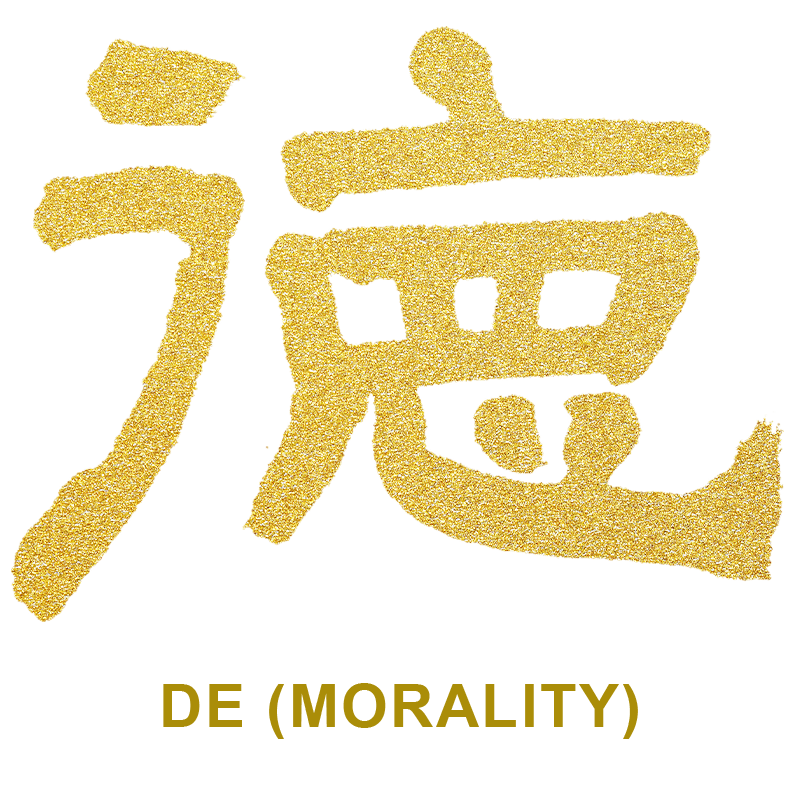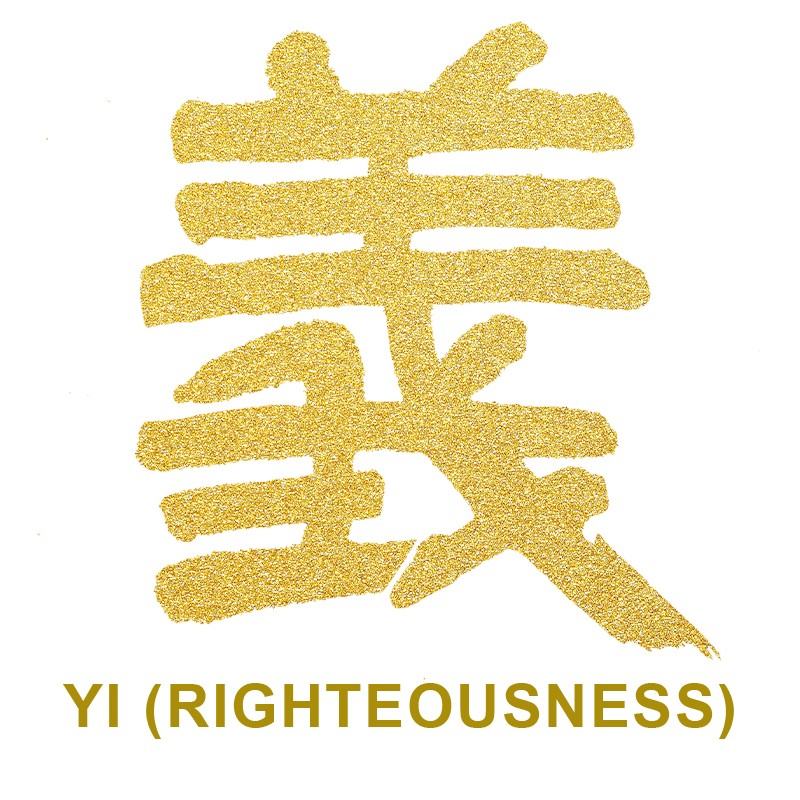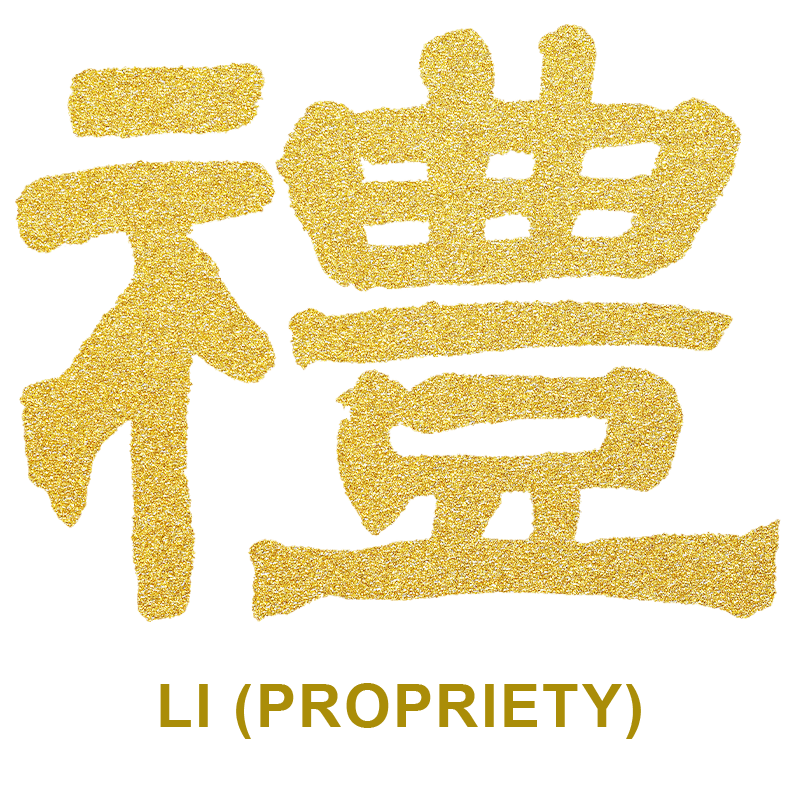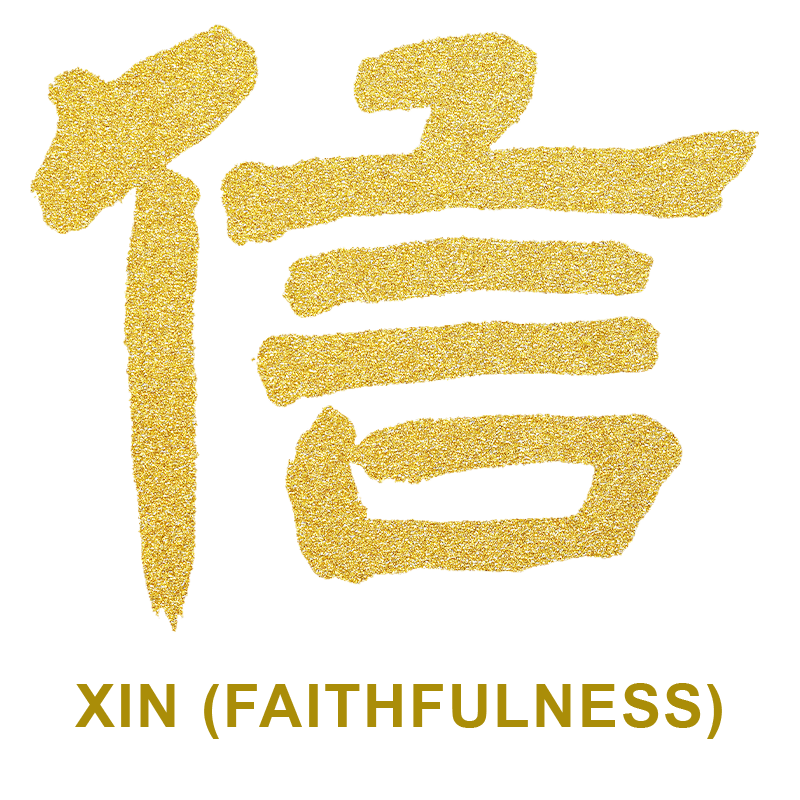The Five Virtues





Morality 德
Morality means virtue and kindness.
Precepts for Women
Ban Zhao, a talented woman in the Eastern Han Dynasty (25–220 AD), was born in a Confucian family. Her father Ban Biao and brother Ban Gu were both famous historians.
At home, Ban Zhao was a sister who cared for her brother. Her brother Ban Chao was an envoy to the Western Regions and had lived outside the Great Wall for a long time. At the age of 70, he requested to return to the Central Plains Region. Ban Zhao wrote to the emperor and requested on behalf of her brother. Her words were sincere and touching, helping Ban Chao to return home smoothly. Her brother Ban Gu wrote the Book of Han but passed away before completing it. Ban Zhao inherited her brother’s will and completed the remaining parts.

Being talented and virtuous, Ban Zhao was often called into the palace by the emperor to teach the imperial concubines, and was honored as a “great master.”
In her later years, Ban Zhao wrote seven chapters of “Precepts for Women” to promote women’s virtue. She believed that women’s biggest virtues are humility and meekness and that they are supposed to handle the relationship between all parties in their husband’s families. She put forward specific requirements for women in four areas: virtue, speech, appearance, and work.
“Precepts for Women” later became a textbook for women’s moral education in ancient times, exerting a profound impact on the shaping of traditional Chinese women’s moral character.

Righteousness義
義 (Yi) was originally a ceremonial instrument in ancient Chinese rituals. It was later extended to the meaning morality, ethics and righteousness.
Beauty Trap
During the waning days of the Eastern Han Dynasty, Diao Chan, one of the Four Beauties, staged a memorable scene of a beauty trap.
Back then, a tyrannical warlord named Dong Zhuo took the opportunity to seize control of the emperor’s court. He dethroned the emperor, killed the emperor and empress, burned the old capital, and even attempted to usurp the throne himself. Dong did all these with the help of his adopted son, a powerful mercenary named Lü Bu. Together, the pair wreaked havoc on the nation.
At a time of life and death for the Han dynasty, one official Wang Yun hoped to use a scheme to get rid of Dong Zhuo. He entrusted the great cause of saving the nation to his adoptive daughter, Diao Chan.
A national beauty, Diao Chan is good at singing and dancing. Meanwhile, she was deeply conscious of the righteousness of her cause. To save the Han Dynasty, she was determined to endure humiliation and stepped forward with the important task.
Under the ingenious arrangement of Wang Yun, Diao Chan successfully drove a wedge between Dong Zhuo and Lü Bu with her beauty, courage, and wisdom, making Lü Bu kill Dong Zhuo, thereby ending the dark period of Dong’s dictatorship. A scourge who made all civilian and military officers helpless was thus wiped out by a woman’s song and dance. Since then, Diao Chan has become the embodiment of righteousness and wisdom, handing down a good name to future generations.
Propriety 禮
The word 禮 originates from the rituals honouring the gods. Later, the norms of ritual activities evolved into the hierarchy, code of conduct and moral principles. The matching word in English is Propriety, meaning conformity to conventionally accepted standards of behaviour or morals.
Meng Guang lifting the food tray as high as her eyebrows.

In ancient times, the phrase ‘lifting the food tray as high as one’s eyebrows’ was often used to describe the relationship between a husband and wife who respected each other and treated each other with courtesy.
Liang Hong, a famous scholar of the Eastern Han Dynasty, and his wife, Meng Guang, were a renowned hermit couple in history. According to the Book of Later Han, they lived in an affluent house and lived a simple life as a couple. Whenever they ate, Meng Guang served her husband’s meal, holding the food tray high up to the level of her eyebrows as a sign of respect for him. Liang Hong humbly accepted the tray with both hands before they started eating.
Liang Hong was known for his knowledge, loyalty and honesty, while Meng Guang looked unattractive, but she had a kind heart. They lived a simple but happy life. The Book of Courtesy mentioned the importance of being courteous and humble. Respect creates courtesy, while courtesy leads to harmony. The ancient sages regarded etiquette as one of the essential characteristics of getting along with people.

Benevolence 仁
Benevolence is the root of righteousness. It means “good will, disposition to do good.”
Empress Zhangsun’s Unlimited Love and Benevolence
Empress Zhangsun was a benevolent and selfless empress. Born into a noble family, she knew how to read and write and was honest and kind. At a young age, she was told the prophecy that “she carries all things, and her virtue is boundless.” At the age of thirteen, she married Li Shimin, who was still the Prince of Qin, and she served his in-laws and taught their children.
During Li Shimin’s conquests and battles, she accompanied him on his campaigns and looked after him so that he could fight without fear. When Li became the emperor, Empress Zhangsun continued to honour the emperor like before and lived a simple and frugal life. She was generous to her concubines and maintained harmony in the harem, allowing Emperor Taizong to concentrate on matters of state. If Emperor Tai Zong consulted her on political issues, she consistently adhered to the traditional ritual of keeping the harem out of politics and advised him politely on the principles of “thinking of danger in peace” and “accepting advice from the wise”. Through her words and actions, Empress Zhangsun won the respect of Emperor Taizong and set an example of a wise and virtuous empress.
Faithfulness 信
The original meaning of 信 in Chinese is truthfulness and, by extension, honesty, non-deception, and credit. The matching word in English is faithfulness, which means loyalty, fidelity, and trustworthiness.
Wang Baochuan staying in the cold kiln
Wang Baochuan, the daughter of a prime minister in the Tang Dynasty (618-907 AD), was married to Xue Pinggui, a poor boy, through a ritual called “throwing the silk ball” witnessed by the public. However, her father despised Xue, who was highly skilled in martial arts but came from a poor family and wanted to break the engagement. Wang, believing in the will of Heaven and respecting Xue’s character, kept the engagement and was expelled by her father from the family.

The two lived a poor but loving life in a cold kiln. To let her husband realize his ambition, Wang encouraged Xue to go to the capital to take the imperial examination. At the same time, she stayed at the cold kiln alone, waiting for her husband’s return. Away from home, Xue joined the army and achieved great success on the battlefield. Yet he did not return for 18 years due to wars. For 18 years, Wang’s life was tough. She suffered from hunger and cold, with no news of her husband or anyone to depend on. However, she kept her marriage vow and believed the couple would eventually reunite.
With her unwavering faith, Wang finally waited for her husband’s return. She gained happiness after suffering and spent the rest of her life with him.
